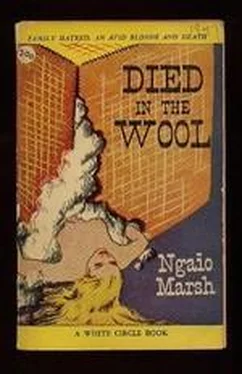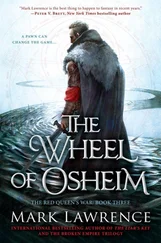Ngaio Marsh - Died in the Wool
Здесь есть возможность читать онлайн «Ngaio Marsh - Died in the Wool» — ознакомительный отрывок электронной книги совершенно бесплатно, а после прочтения отрывка купить полную версию. В некоторых случаях можно слушать аудио, скачать через торрент в формате fb2 и присутствует краткое содержание. Жанр: Классический детектив, на английском языке. Описание произведения, (предисловие) а так же отзывы посетителей доступны на портале библиотеки ЛибКат.
- Название:Died in the Wool
- Автор:
- Жанр:
- Год:неизвестен
- ISBN:нет данных
- Рейтинг книги:4 / 5. Голосов: 1
-
Избранное:Добавить в избранное
- Отзывы:
-
Ваша оценка:
- 80
- 1
- 2
- 3
- 4
- 5
Died in the Wool: краткое содержание, описание и аннотация
Предлагаем к чтению аннотацию, описание, краткое содержание или предисловие (зависит от того, что написал сам автор книги «Died in the Wool»). Если вы не нашли необходимую информацию о книге — напишите в комментариях, мы постараемся отыскать её.
Died in the Wool — читать онлайн ознакомительный отрывок
Ниже представлен текст книги, разбитый по страницам. Система сохранения места последней прочитанной страницы, позволяет с удобством читать онлайн бесплатно книгу «Died in the Wool», без необходимости каждый раз заново искать на чём Вы остановились. Поставьте закладку, и сможете в любой момент перейти на страницу, на которой закончили чтение.
Интервал:
Закладка:
Again Fabian looked up at the painting. “You said you thought that blank affair up there was like her. Why?”
Without glancing at the portrait, Miss Lynne said: “It’s a stupid-looking face in the picture. In my opinion that’s what she was. A stupid woman.”
CHAPTER V
ACCORDING TO TERENCE
The aspect of Terence Lynne that struck Alleyn most forcibly was her composure. He felt quite sure that, more than any of them, she disliked and resented these interminable discussions. Yet she answered his questions composedly. Unlike her companions, she showed no sign of launching into a continuous narrative, and the sense of release which had encouraged them to talk was, he felt certain, absent in Miss Lynne. He had a feeling that unless he was careful he would find himself engaged in something very like a routine police interrogation. This, above all things, he was anxious to avoid. He wanted to retain his position as an onlooker before whom the spoil of an indiscriminate rummage was displayed, leaving him free to sort, reject and set aside. Terence Lynne waited for a specific demand, yet her one contribution up to date had been, in its way, sufficiently startling.
“Here at least,” Alleyn said, “are two completely opposed views. Losse, if I remember him, said Mrs. Rubrick was as clever as a bagful of monkeys. You disagree, Miss Lynne?”
“She had a few tricks,” said Terence. “She could talk.”
“To her electors?”
“Yes, to them. She had the knack. Her speeches sounded rather effective. They didn’t read well.”
“I always thought you wrote them for her, Terry,” said Fabian with a grin.
“If I’d done that they would have read well and sounded dull. I haven’t the knack.”
“But wasn’t it pretty hot to know what they’d like?” asked Douglas.
“She used to listen to people on the wireless and then adapt the phrases.”
“By golly, so she did!” cried Fabian delightedly. “Do you remember, Ursy, the clarion call in the speech on rehabilitation? ‘We shall settle them on the good ground, in the fallow Melds, in the workshops and in the hills. We shall never abandon them!’ Good Lord, she had got a nerve.”
“It was utterly unconscious!” Ursy declared. “An instinctive echo.”
“Was it!” said Terence Lynne quietly.
“You’re unfair, Terry.”
“I don’t think so. She had a very good memory for other people’s ideas. But she couldn’t reason very well and she used to make the most painful floaters over finance. She hadn’t got the dimmest notion of how her rehabilitation scheme would work out financially.”
“Uncle Arthur helped in that department,” said Fabian.
“Of course he did.”
“He played an active part in her public life?” asked Alleyn.
“I told you,” she said, “I think it killed him. People talked about the shock of her death but he was worn-out before she died. I tried to stop it happening but it was no good. Night after night we would sit up working on the notes she handed over to him. She gave him no credit for that.”
She spoke rapidly and with more colour in her voice. Hullo, Alleyn thought, she’s off!
“His own work died of it, too,” she said.
“What on earth do you mean, Terry?” asked Fabian. “What work?”
“His essays. He’d started a group of six essays on the pastoral element in Elizabethan poetry. Before that, he wrote a descriptive poem treating the plateau in the Elizabethan mode. That was the best thing he did, we thought. He wrote very lucidly.”
“Terry,” said Fabian, “you bewilder me with these revelations. I knew his taste in reading of course. It was surprisingly austere. But — essays? I wonder why he never told me.”
“He was sensitive about them. He didn’t want to talk about them until they were complete. They were really very good.”
“I should have liked to know,” said Fabian gently. “I wish he had felt he could tell me.”
“I suppose he had to have a hobby,” said Douglas. “He couldn’t play games of course. There’s nothing much in that, just doing a bit of writing, I mean.”
“ ‘Scribble, scribble, scribble, Mr. Gibbon.’ ” Alleyn muttered. Terence and Fabian looked quickly at him and Fabian grinned.
“They were never finished,” said Terence. “I tried to help by taking down at his dictation and then by typing, but he got so tired and there were always other things.”
“Terry,” said Fabian suddenly, “have I by any chance done you rather a bloody injustice?”
Alleyn saw the oval shape of Terence’s face lift attentively. It was the colour of a Staffordshire shepherdess, a cool cream. The brows and eyes were dark accents, the mouth a firm red brush stroke. It was an enigmatic face, a mask framed neatly in its sleek cap of black hair.
She said: “I tried very hard not to complicate things.”
“I’m sorry,” said Fabian. She raised her hands a little way and let them fall into her lap.
“It doesn’t matter,” she said, “in the very least. It’s all over. I didn’t altogether succeed.”
“You people!” Fabian said, bending a look of tenderness and pain upon Ursula. “You rather make for complications.”
“We people?” she said. “Terry and me?”
“Both of you, it seems,” he agreed.
Douglas suddenly, raised his cry of: “I don’t know what all this is about.”
“It doesn’t matter,” Terence repeated. “It’s over.”
“Poor Terry,” said Fabian, but it seemed that Miss Lynne did not respond easily to sympathy. She took up her work again and the needles clicked.
“Poor Terry,” Douglas echoed playfully, obtusely, and sat beside her again, laying his big muscular hand on her knee.
“Where are the essays?” Fabian asked.
“I’ve got them.”
“I’d like to read them, Terry. May I?”
“No,” she said coldly.
“Isn’t that rather churlish?”
“I’m sorry. He gave them to me.”
“I always thought,” said Douglas out of a clear sky, “that they were an ideal couple. Awfully fond of each other. Uncle Arthur thought she was the cat’s whiskers. Always telling people how marvellous she was.” He slapped Terence’s knee. “Wasn’t he?” he persisted.
“Yes.”
“Yes,” said Ursula. “He was. He admired her tremendously. You can’t deny that, Fabian.”
“I don’t deny it. It’s incredible but true. He thought a great deal of her.”
“For the things he hadn’t got,” said Terence. “Vitality. Initiative. Drive. Popularity. Nerve.”
“You’re prejudiced,” Ursy said fiercely, “you and Fabian. It’s not fair. She was kind, kind and warm and generous. She was never petty or spiteful and how you, both of you, who owed her so much—”
“I owed her nothing whatever,” said Terence. “I did my job well. She was lucky to have me. I admit she was kind in the way that vain people are kind. She knew how kind she was. She was quite kind.”
“And generous?”
“Yes. Quite.”
“And unsuspicious?”
“Yes,” Terence agreed after a pause. “I suppose so.”
“Then I think it’s poor Florence Rubrick,” said Ursula stoutly. “I do indeed, Terry.”
“I won’t take that,” Terence said, and for the first time Alleyn heard a note of anger in her voice. “She was too stupid to know, to notice how fortunate she was… might have been… She didn’t even look after her proprietary rights. She was like an absentee landlord.”
“But she didn’t ask you to poach on the estates.”
“What are you two arguing about?” demanded the punctual Douglas. “What’s it all in aid of?”
“Nothing,” said Fabian. “There’s no argument. Let it go.”
Читать дальшеИнтервал:
Закладка:
Похожие книги на «Died in the Wool»
Представляем Вашему вниманию похожие книги на «Died in the Wool» списком для выбора. Мы отобрали схожую по названию и смыслу литературу в надежде предоставить читателям больше вариантов отыскать новые, интересные, ещё непрочитанные произведения.
Обсуждение, отзывы о книге «Died in the Wool» и просто собственные мнения читателей. Оставьте ваши комментарии, напишите, что Вы думаете о произведении, его смысле или главных героях. Укажите что конкретно понравилось, а что нет, и почему Вы так считаете.










